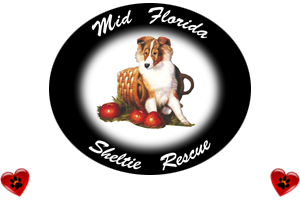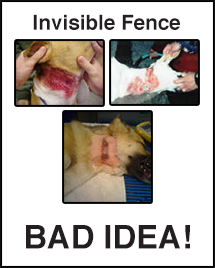- Are shelties miniature collies?
- Where do you get the dogs that are up for adoption?
- Why would someone give up their sheltie?
- What do you do when a sheltie is brought to you?
- How do I adopt a dog from Sheltie Rescue?
- How long will I have to wait after I submit my application to adopt a sheltie?
- What does Rescue charge for an adoption?
- What happens if the adoption doesn’t work?
- Why can’t I breed the the dog I adopt from Rescue?
- Should I have my sheltie obedience trained?
- What should I do if I have a question about training or the dog after adoption?
- Why should I adopt an older sheltie?
Are shelties miniature collies?
No, they are actually a separate breed. They range in size from 12-19″ at the shoulder and weigh from 10-40 pounds. The ears on the sheltie are correct if tipped about one third. Most pet shelties’ undercoats are short, furry, and dense. They should be brushed at least once a week for about half an hour to keep the coat clean and free of mats and given occasional baths. Shelties shed heavily twice a year, the heaviest in the summer, when more frequent brushing is necessary.
Shelties come in 3 basic colors: sable, tri-colored, and blue merle. Although uncommon and not allowed under breed standards, shelties can also be solid white.
Shelties are intensely loyal, affectionate, and responsive to their owners. They are excellent with children as long as the children are good with them. They are small, intelligent, very sensitive and will not tolerate abuse from anyone. Sometimes shelties are confused by the quick, erratic movement of children and will try to “herd” them. This is sometimes interpreted as aggression when it is actually only part of their instinct.
Since most shelties are inactive house pets, they do not need large quantities of food. They should be kept fairly lean. Excessive weight is hard on the heart and, as in many other breeds, will shorten the life span. The typical 15″sheltie should weigh just over 20 pounds.
Shelties’ desire to please, combined with their high intelligence make them outstanding in obedience training. Because of their heritage of herding/watch dogs, shelties have a tendency to bark. This can be a real problem at times. Although the sheltie makes an excellent “alarm” dog, he/she does not physically threaten; and, after sounding a warning, they usually retreat or escort the visitor through the house. Shelties are enthusiastic at exercise in work and play.
With proper care, shelties can live 8-14 years or more. Congenital defects include eye and skin problems, neither of which is prevalent. Many shelties have thyroid problems, making them eiher too lean or overweight and often giving them a sparse, greasy looking coat. As with all breeds, medical problems may arise. One such problem which commonly occurs is urinary disease. With regular visits to your veterinarian and proper care, many of these problems can be prevented or minimized.
Where do you get the dogs that are up for adoption?
The orphans generally come from owners, who for any number of reasons, choose to give up their pets. We also act as a referral service for these individuals. We cooperate with other humane organizations, pounds, shelters, and SPCAs and are occasionally called upon to pick up the animals from abusive environments or those that are found as strays.
Why would someone give up their sheltie?
People often buy a dog on impulse or for their children. A pet requires a tremendous commitment of time and energy, and frequently the acquisition of a sheltie is not thoroughly thought through. The owner may also have had health problems, etc. that necessitates the removal of the pet from the home.
What do you do when a Sheltie is brought to you?
If current health records are not available or up to date, the sheltie is taken immediately to a veterinarian for any necessary vaccinations, or needed medical treatment. We have each animal spayed or neutered before adoption, as we do not adopt out un-spayed or un-neutered dogs. Our orphans generally live in a “foster” home with one of our volunteers where they are evaluated for temperament and activity level, and remain there until they are adopted.
How do I adopt a dog from Sheltie Rescue?
Filling out an adoption application is your first step. The application will tell us a little bit about you and what type of sheltie you want. Your application will be carefully reviewed by us. If approved, you will be notified by one of our volunteers as soon as an animal matching your application is available. You will then be scheduled for a personal interview and to meet the sheltie we have chosen for you based on the information supplied to us on your application.
How long will I have to wait after I submit my application to adopt a sheltie?
We do not seek out shelties in need of adoption, although our “supply” of orphans has been steady. The waiting period can be from two weeks to six months or more.
What does Rescue charge for an adoption?
The adoption donation, which helps cover veterinary costs, any necessary medicines and food, is from $325.00 – $450.00, depending on the age and/or health of the dog.
What happens if the adoption doesn’t work?
Our Rescue is extremely careful in evaluation and placing its dogs, but if you cannot keep the animal, for any reason, it must come back us.
Why can’t I breed the the dog I adopt from Rescue?
Rescue’s goal is to place its orphans in a pet home. With the explosion that is taking place,we believe that breeding is best left to those individuals who truly want to better the breed, and who understand the time, work, and responsibility involved with the breeding process. Breeding is hard work, and should never be undertaken “for the children” or to “get money out of the dog.”
Should I have my sheltie obedience trained?
A resounding YES is our answer to that question. Obedience training will create a bond between you and your dog, and will make your sheltie a friend you can be proud of. Our volunteers will be happy to get you started on the right foot and refer you to various dog training clubs and classes.
What should I do if I have a question about training or the dog after adoption?
We stand behind each of our dogs — for the life of the dog. If you ever have any questions, or just want to brag about your dog, please pick up the phone and call us!
Why should I adopt an older sheltie?
Our older dogs need homes just as much as our younger dogs. Please consider adopting an older dog since there are many benefits in doing this. They are great companions. In general they tend to be less active (this may be a positive point depending on your home situation), but this doesn’t mean these dogs are couch potatoes.
You also don’t need to worry about getting through the puppy stages of chewing and accidents in the house. Older dogs are much wiser and have already experienced this.
Another benefit to adopting an older sheltie is that they are small dogs and have longer life spans than bigger dogs.



